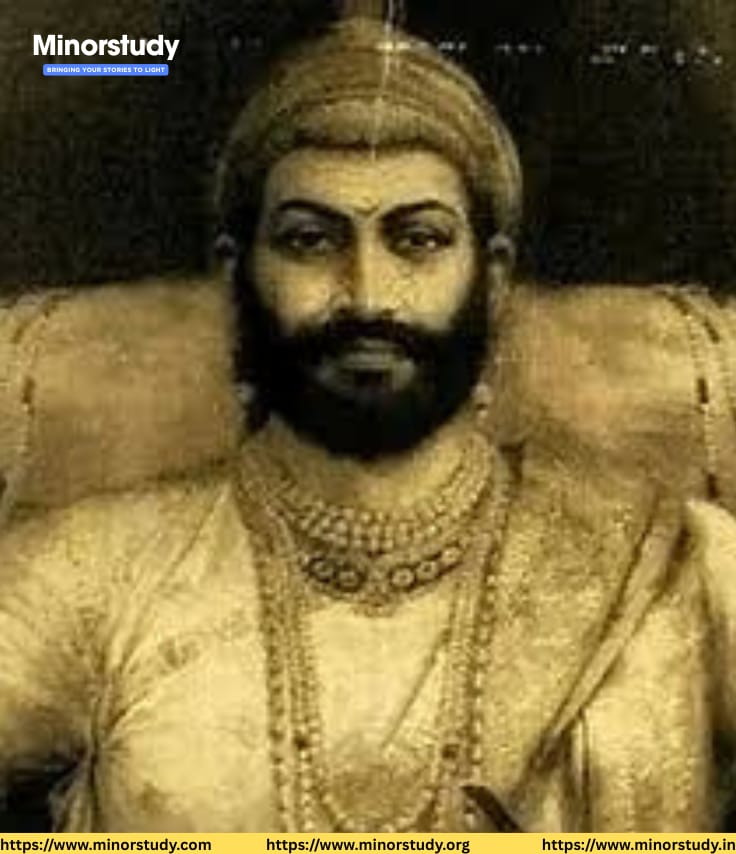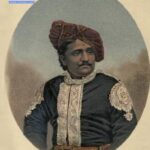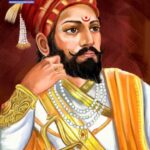🏔️ Introduction: A Fearless Flame in the Heart of India
Shivaji Maharaj: In the turbulent 17th century, as India lay under the oppressive grip of the Mughals and Deccan sultanates, one man emerged from the Sahyadri hills to rewrite history — Chhatrapati Shivaji Maharaj, the founder of the Maratha Empire.
- 🏔️ Introduction: A Fearless Flame in the Heart of India
- 📜 Timeline: Life and Key Milestones of Shivaji Maharaj
- 🛕 Historical Overview: How Shivaji Founded the Maratha Empire
- 🔹 Birth and Early Life
- 🔹 The Oath of Swarajya
- 🔹 Rise Against the Mughals and Adilshahi
- 🔹 The Coronation and Establishment of the Empire
- 🔹 Administration and Legacy
- 💥 7 Heroic Truths That Prove Why Shivaji Was the Fearless Founder India Needed
- 1. 🛡️ Father of Guerrilla Warfare in India
- 2. 🏹 Established a Sovereign Hindu Kingdom in a Mughal-Dominated Era
- 3. 📜 Built a Just and Transparent Administration
- 4. ⚔️ Respecter of Women and Humanity in Warfare
- 5. 🌍 Promoter of Naval Power and Fort Engineering
- 6. 🧠 A Secular Hindu Ruler with Vision
- 7. 🏛️ Inspired Generations of Leaders and Revolutionaries
- 📚 Important Facts About Shivaji Maharaj
- 🙋 FAQs About Shivaji Maharaj
- Q1: Who founded the Maratha Empire?
- Q2: Why is Shivaji Maharaj considered great?
- Q3: Did Shivaji respect other religions?
- Q4: What were Shivaji’s military tactics?
- Q5: How is Shivaji relevant today?
- 🌺 Wishing and Respect
- 🌱 Importance in Our Lives
- 🌍 Societal Impact
- 📌 Important Points to Remember
- 💡 Life Lessons from Shivaji Maharaj
- 🏁 Conclusion: The Eternal Flame of Swarajya
Not just a warrior but a visionary, not merely a king but a people’s protector, Shivaji carved out Swarajya (self-rule) from tyranny and established an empire based on justice, Hindu pride, and people-first governance.
📜 Timeline: Life and Key Milestones of Shivaji Maharaj
| Year | Event |
|---|---|
| 1630 | Born in Shivneri Fort to Shahaji Bhosale and Jijabai |
| 1645 | Took oath of Swarajya at Raireshwar temple |
| 1659 | Killed Afzal Khan in a legendary encounter |
| 1674 | Crowned as Chhatrapati at Raigad Fort |
| 1680 | Passed away at Raigad Fort |
🛕 Historical Overview: How Shivaji Founded the Maratha Empire
🔹 Birth and Early Life
Born in 1630 CE at Shivneri Fort in present-day Maharashtra, Shivaji was the son of Shahaji Bhosale, a Maratha general in the Deccan sultanates, and Jijabai, a deeply spiritual and patriotic woman. It was his mother’s vision and teachings that planted the seed of Swarajya in his heart.
🔹 The Oath of Swarajya
At the tender age of 15, Shivaji pledged to establish self-rule at Raireshwar temple. This wasn’t just symbolic — it was a clarion call to a new India free from foreign rule.
🔹 Rise Against the Mughals and Adilshahi
With just a handful of loyal Mavalas (hill warriors), Shivaji began capturing forts like Torna, Purandar, and Sinhagad. His guerrilla warfare strategy caught even the mighty Mughal Empire off guard. He famously killed Afzal Khan, the ruthless Adilshahi general, with his wagh nakh (tiger claws).
🔹 The Coronation and Establishment of the Empire
On 6th June 1674, Shivaji was crowned as Chhatrapati at Raigad Fort, formally founding the Maratha Empire. He adopted Hindu Rajya rituals, reaffirming dharma-based governance and sovereignty.
🔹 Administration and Legacy
Shivaji built a highly efficient civil administration, introduced ashtapradhan mandal (council of eight ministers), maintained religious tolerance, and protected women and farmers. His rule became a model for governance with integrity.
💥 7 Heroic Truths That Prove Why Shivaji Was the Fearless Founder India Needed
1. 🛡️ Father of Guerrilla Warfare in India
Shivaji’s Ganimi Kava (guerrilla tactics) stunned massive armies. Using hill forts, night raids, and rapid mobility, he turned military science on its head.
2. 🏹 Established a Sovereign Hindu Kingdom in a Mughal-Dominated Era
At a time when most Indian kings bowed to the Mughals or sultanates, Shivaji established a Hindu kingdom based on justice and swarajya, igniting nationalistic spirit across the subcontinent.
3. 📜 Built a Just and Transparent Administration
His administration ensured land revenue reforms, fair taxation, and village-level governance, earning him the title of a people’s king.
4. ⚔️ Respecter of Women and Humanity in Warfare
Shivaji’s army was strictly forbidden from harming women or looting commoners — a code of honor that even modern armies admire.
5. 🌍 Promoter of Naval Power and Fort Engineering
He was the first Indian king to build a naval force, understanding the strategic importance of the Konkan coast. He fortified sea forts like Sindhudurg and Suvarnadurg, making Maratha naval defense impenetrable.
6. 🧠 A Secular Hindu Ruler with Vision
Though he reinstated Hindu pride, Shivaji employed Muslims in high ranks and respected all religions, creating an inclusive empire.
7. 🏛️ Inspired Generations of Leaders and Revolutionaries
From Bal Gangadhar Tilak to Netaji Subhas Chandra Bose, every freedom fighter found inspiration in Shivaji’s bravery and governance model.
📚 Important Facts About Shivaji Maharaj
Born: February 19, 1630 (Shivneri Fort)
Mother: Jijabai
Father: Shahaji Bhosale
Guru: Dadoji Konddev (mentor), Samarth Ramdas (spiritual guide)
Capital: Raigad
Crowned: 1674
Died: April 3, 1680
Samadhi: Raigad Fort
🙋 FAQs About Shivaji Maharaj
Q1: Who founded the Maratha Empire?
Chhatrapati Shivaji Maharaj in the 17th century.
Q2: Why is Shivaji Maharaj considered great?
He stood for freedom, justice, and administration, and established a sovereign empire against powerful adversaries.
Q3: Did Shivaji respect other religions?
Yes, he was deeply secular and appointed people based on merit, not religion.
Q4: What were Shivaji’s military tactics?
Guerrilla warfare, surprise raids, use of terrain, fortification, and naval strength.
Q5: How is Shivaji relevant today?
He symbolizes national pride, strategic thinking, and ethical governance.
🌺 Wishing and Respect
🌟 Salutations to the great Chhatrapati Shivaji Maharaj, the sword that slashed injustice and the heart that beat for Swarajya.
🌟 May his legacy inspire every Indian to live with courage, discipline, and honor.
🌟 Jai Bhavani, Jai Shivaji!
🌱 Importance in Our Lives
Even today, Shivaji’s life holds immense relevance:
Leadership: He led by example — from the front.
Crisis Management: Rebounded stronger after setbacks.
People’s Champion: Listened, protected, and ruled fairly.
Youth Inspiration: Proves that age is no barrier to revolution.
🌍 Societal Impact
Shivaji Maharaj:
Awakened national consciousness centuries before India’s freedom movement.
Empowered local languages, traditions, and artisans.
Redefined Dharma not as religion but ethical statecraft.
Is seen as a symbol of resistance against tyranny in Indian folklore, poetry, theatre, and cinema.
📌 Important Points to Remember
Took oath of Swarajya as a teenager
Master of fort-based warfare
Protected dignity of women and farmers
Created India’s first indigenous navy
Balanced valor with humility
Inspired an empire that lasted 150+ years
💡 Life Lessons from Shivaji Maharaj
Have a vision bigger than yourself.
Stay rooted in values but open to innovation.
Leadership is about service, not show.
Never compromise on honor, even if the odds are against you.
🏁 Conclusion: The Eternal Flame of Swarajya
Shivaji Maharaj was more than a king.
He was an idea, a force, and a revolution.
He proved that with courage and vision, even a young boy from the hills could challenge empires and build a legacy that still shapes hearts today.
In a world of self-interest, Shivaji stands tall as a selfless hero who ruled not for wealth, but for his people.









1с облако личный кабинет вход 1с предприятие в облаке
Hey there! I’ve been reading your website for a while now and finally got the bravery to go ahead and give you a shout out from Dallas Tx! Just wanted to tell you keep up the great job!